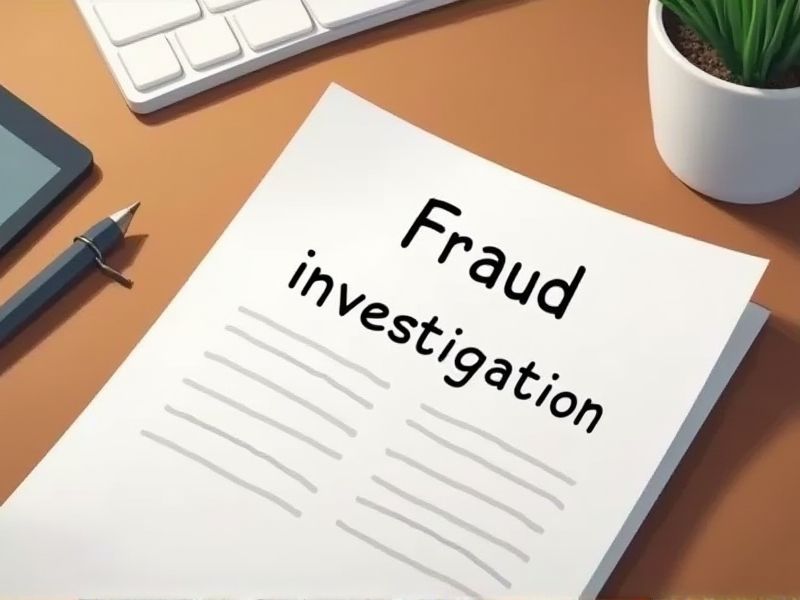
Fraud investigators operate in complex environments where accuracy and proficiency are critical in uncovering financial irregularities and deceit. Certifications like Certified Fraud Examiner (CFE) ensure that investigators are well-versed in ethics, legal issues, and investigative techniques. These credentials not only augment an investigator's knowledge base but also enhance credibility when dealing with stakeholders and legal entities. Here are some key certifications you might consider for a career in fraud investigation.
Certified Fraud Examiner (CFE)
The CFE credential equips professionals with advanced knowledge in fraud prevention, detection, and investigation, which directly enhances their efficacy in uncovering fraudulent activity. With CFEs being versed in the intricacies of financial transactions and legal implications, investigations are more thorough and targeted. Holding a CFE indicates a high level of expertise in ethical decision-making and integrity, essential traits for conducting impartial investigations. Employers and clients place greater trust in CFEs, recognizing their commitment to staying updated on the latest fraud schemes and investigative techniques.
Certified Financial Crime Specialist (CFCS)
Certified Financial Crime Specialists (CFCS) possess comprehensive training in recognizing and combating complex financial crimes, enhancing the effectiveness of a Fraud Investigator. Their expertise in regulations and financial crime trends enables more accurate identification and prevention strategies. Certification often leads to a stronger credibility in investigations, fostering trust from stakeholders and regulators. Equipped with CFCS certification, a Fraud Investigator is better prepared to navigate the evolving landscape of financial crime tactics.
Certified Anti-Money Laundering Specialist (CAMS)
Certified Anti-Money Laundering Specialist (CAMS) certification equips fraud investigators with in-depth knowledge of money laundering tactics and compliance requirements, enhancing their ability to detect fraudulent activities. This certification acts as a benchmark for expertise, ensuring that investigators are up-to-date with evolving legal frameworks and regulatory standards. It provides the necessary tools and methodologies for identifying complex money laundering schemes, thereby improving the efficiency and effectiveness of investigations. The CAMS certification also instills a higher level of credibility and trustworthiness in the investigator's professional standing, often leading to better career opportunities and outcomes.
Certified Information Systems Auditor (CISA)
Possessing a CISA certification significantly enhances a fraud investigator's ability to assess and strengthen information systems controls, which directly influences their effectiveness in detecting fraudulent activities. The certification provides a comprehensive understanding of IT audit processes, elevating the investigator's capability to identify irregularities in system operations. By holding a CISA, the investigator gains a reputable credential that increases trust among stakeholders, which is crucial during fraud investigations. The certification's emphasis on governing and managing IT enhances the investigator's skills in analyzing and interpreting complex technical data linked to fraudulent transactions.
Certified in Risk and Information Systems Control (CRISC)
CRISC certification provides a strong understanding of risk management frameworks, essential for identifying and assessing fraud risks in an organization. It equips fraud investigators with the skills to implement effective information systems controls that help prevent fraudulent activities. The certification enhances the ability to communicate risk analysis and control implementation to various stakeholders, improving fraud detection and response strategies. CRISC also validates a professional's capability to maintain and improve an organization's cyber hygiene, minimizing vulnerabilities that could be exploited for fraudulent purposes.
Certified Hacking Forensic Investigator (CHFI)
The role of a Certified Hacking Forensic Investigator (CHFI) is crucial for a fraud investigator because they possess specialized skills to collect digital evidence that is admissible in court. Digital fraud increasingly involves complex technological methods, and CHFI professionals are equipped to analyze these digital trails meticulously. Fraud investigators rely on their expertise to dissect technical incidents and trace activities back to the perpetrators. Companies often face cyber threats that can lead to financial harm, and CHFI experts ensure a structured approach to safeguarding assets.
Certified Cyber Forensics Professional (CCFP)
Certified Cyber Forensics Professional (CCFP) equips fraud investigators with specialized knowledge in handling digital evidence which enhances the accuracy of fraud detection processes. Expertise from CCFP training allows for the identification of digital footprints, critical in uncovering fraudulent activities. Methods taught in CCFP courses improve the ability to preserve evidence integrity, essential for legal proceedings. With the rise of digital crime, CCFP certification ensures fraud investigators stay adept in the evolving landscape of cyber threats.
Certified Compliance and Ethics Professional (CCEP)
Obtaining the Certified Compliance and Ethics Professional (CCEP) credential provides a comprehensive understanding of compliance regulations, which directly enhances a fraud investigator's ability to identify and address fraudulent activity. This certification offers specialized knowledge in ethics and compliance laws that are crucial in detecting and preventing potential misconduct within organizations. A CCEP credential signifies an investigator's commitment to upholding integrity and ethical behavior, building trust with clients and stakeholders. The rigorous training required for CCEP enriches an investigator's skill set by integrating ethical perspectives with investigatory practices, leading to more effective fraud detection and resolution.
Certified Forensic Interviewer (CFI)
The Certified Forensic Interviewer (CFI) credential ensures that a fraud investigator possesses specialized skills in conducting effective and legally sound interviews. Enhanced interviewing techniques increase the possibility of obtaining reliable and admissible information for fraud investigations. Proper training reduces the risk of coercive or misleading questioning, safeguarding against wrongful claims or violations. Consistent standards provided by CFI credentialing improve the credibility of investigation outcomes in legal proceedings.
Certified eCrime Investigator (CECI)
Fraud schemes have become increasingly sophisticated, leading to a higher demand for specialized expertise in e-crimes. A Certified eCrime Investigator (CECI) possesses the skills necessary to identify and combat digital threats effectively. As fraud often involves navigating complex digital networks, having a CECI on board enhances an investigator's capability to track cybercriminals. The certification ensures that investigators are well-versed in the latest techniques and tools required to efficiently address and resolve e-crime incidents.
Summary
When you, as a fraud investigator, obtain certifications, your credibility and expertise in the field significantly increase. This added knowledge can lead to more accurate detection and prevention of fraudulent activities. Colleagues and employers may value you more, potentially resulting in career advancement opportunities. Furthermore, certifications can enhance trust among stakeholders, fostering stronger professional relationships.
